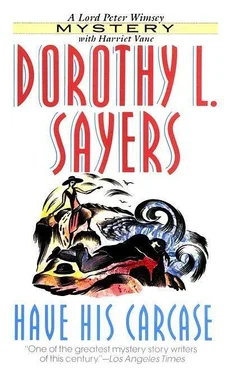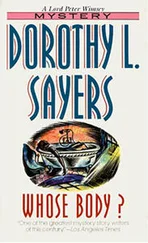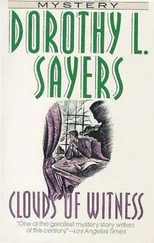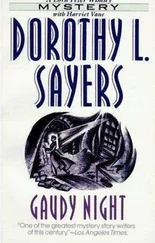‘Very likely,’ said Umpelty. That would account for its getting hitched-up over the times.’
‘Possibly. Well, on the Thursday, Alexis starts off for the Flat-Iron according to instructions. By the way, it was necessary that the body should be found and recognised hence, I fancy, the fact that Alexis was told to go openly to the rock by the-coast-road. In case the body got lost, there would be witnesses to say that he had been last seen going in that direction, and to suggest a possible area for search. It would never have done for him simply to disappear like snow upon the desert’s dusty face.
‘So Alexis goes off to look for a crown. Meanwhile, Henry Weldon has run a needle through the H.T. leads of the Morgan, so as to provide a very good reason for asking for a lift into Wilvercombe. And now you see why a Morgan. It had to be something with only two cylinders, if the whole ignition was to be put out of action with one needle: that is a Morgan, a Belsize-Bradshaw or a motor-bike. He probably avoided the bike on the ground of exposure to weather, and chose the Morgan as the next most handy and numerous two-cylinder bus.’
Inspector Umpelty smacked his thigh, and then, remembering that none of all this did away with the central snag in the case, blew his nose mournfully.
‘Shortly after: ten o’clock, along comes Mrs Morecambe in the Bentley with the conspicuous number-plate. That number-plate was pure bunce for them — they can scarcely have picked or wangled it on purpose, but it came in very convenient as a means of identifying the bus. What more natural than that Weldon, if questioned, should remember a number so screamingly funny as that? Oi, oi, oi! Highly humorous, wasn’t it, Inspector?’
‘Where did she put him down, then?’ asked Umpelty, scowling.
‘Anywhere, out of sight of the village and the passing throng. At some point where he can cut across the fields to the shore again. The road turns in rather sharply from the coast between Darley and Wilvercombe, which doubtless accounts for their having left him so much time for his walk back. In any case, by, say, 11.15, he has walked back to Darley and is cocking an eye over the fence at Farmer Newcombe’s bay mare. He pulls a stake out of the hedge and goes into the field, with oats in one hand and a rope-bridle in the-other.’.
‘What did he want to take oats for?’ Surely the horse would have come up to him if he just said “Coop” or whatever it is and shaken his hat about? It seems silly of him to scatter oats; all over the place like that.’
‘Yes, my child,’ said Wimsey. ‘But there was a reason for that. I think the oats he scattered were from the day before, when he first started to make friends with the mare. Teach an animal to come for food once and it’ll come twice as fast the second time; but once disappoint it, and it won’t come at all.’
‘Yes, of course. You’re quite right.’
‘Now,’ said Wimsey, ‘I think, I can’t prove it, but I think, our hero left most of his clothes behind him. I’m not certain, but it seems an obvious precaution. At any, rate, he bridled the mare and mounted her and rode off. You’ve got to remember that between Darley and Pollock’s cottage the shore is hidden from the road, so that the only risk he ran of being seen was by somebody straying on the edge of the cliff itself. And they would probably not worry much about a man exercising a horse along the shore. His real awkward moment was the passing of the cottages, but he had carefully chosen the very time when the working-classes have their dinner. I fancy he went past there just before midday.’
‘They heard hoofs about that time.’
‘Yes. And a little later, Paul Alexis heard them too, as he sat on his rock and dreamed of the Imperial Purple. He looked and saw the Rider from the Sea.’
‘Quite so,’ said Umpelty, unmoved. ‘And what, then?’
‘Ah! — you recollect that we are merely describing an. ideal crime, in which everything works out as planned.’
‘Oh, yes — of course.’
‘Then — in the ideal crime Weldon rides up to the rock through the water — and by the way, you will bear in mind that it is fully an hour before low tide and.that there is a foot and a half of water at the foot of the Flat-Iron: He ties the mare close by the head to the ring-bolt put there the day before, and he climbs up on to the rock. Alexis may or may not have recognised him. If he did.’
Wimsey paused, and his eyes grew angry.
‘Whether he did or not, he hadn’t much time for disappointment. Weldon asked him to sit down, I think; emperors sit, while respectful commoners stand behind them, you see. Weldon asked for the letter, and Alexis gave him the decoded translation. Then he leaned over him from behind with the razor.
‘Weldon, of course, was a fool. He did everything wrong that he could do. He ought to have removed those gloves, and he ought to have seen to it that he had the original letter. Perhaps he ought to have searched the body. But I think that would have been worse still. It might have destroyed the suicidal appearance. Once move a body and you never can, recapture the first, fine, careless rapture, don’t you know. And besides, the mare was struggling and nearly breaking away. That would have been fatal…’
‘Do you know, I rather take my hat off to Weldon about this. Ever seen a horse that has suddenly had fresh blood splashed all over it? Not pretty. Definitely not. Cavalry horses have to get used to it, of course but the bay mare could never have smelt blood before. When I realise that Weldon had to mount that squealing, plunging, terrified brute bareback from the top of a rock, and ride her away without letting her once plunge on to the sand, I tell you, I take off my hat.’
‘You mean, you would have had to, if it had happened that thick way.’
‘Exactly. A man who could seriously contemplate bringing that scheme off knew something about horses. He may even have known too much. I mean… there are ways and ways of subduing violent animals, and some ways are crueller than others….’
‘We’ll suppose he did it. ‘That he somehow got the mare untied from the rock and forced her straight out to sea. That would be the best way. That would tire her out, and at the same time wash the blood away. Then, having got control of her, he rides back as he came. But she has loosened a shoe in her frantic plunging and kicking, and on the way back she wrenches it off, altogether. Probably he doesn’t notice that. He rides on past his camp to wherever he left his clothes, looses the mare, gets dressed and hurries out to flag the Bentley on the return journey. I don’t suppose he gets there much before, say 12.55. He’s picked up and set down at the Feathers at one o’clock. Here we leave romance and come back to the facts. Then, after lunch, he goes down to his own place, burns the rope-bridle, which is bloody, and kicks out our friend Perkins, who seems disposed to take too much interest in the rope.’
‘He hadn’t the rope with him at the Feathers, had he?’
‘No; I expect he threw it down inn some handy, spot on his way back from the Flat-Iron — somewhere near the stream, I should imagine. Well, all he has to do after that is to get Polwhistle to come along and deal with the Morgan. He made another mistake there, of course. When he was putting those leads in his pocket he should have put them in his pocket and seen that they stayed put.
‘But you see that he, too, was intended to have three lines of defence.; First, of course, thee death was to look like suicide; secondly, the camper at Darley Halt was to be Mr Martin of Cambridge, having no connection with anybody; and thirdly, if Mr Martin was proved to be Henry Weldon, there was the alibi in Wilvercombe, with all the details about Bach and shirt-collars, and an absolutely independent witness in a Bentley car to swear to the story.’
Читать дальше












